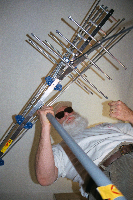Cornell University Broadband Adaptive Receiver Design Project

Note: This project is no longer active, and this website has not been maintained since early 2006.
Welcome to the home page of the Broadband Adaptive Receiver Design
(BARD) Project (part of the Cornell University Blind Equalization Research
Group (C.U. BERG)). The members of our research group are faculty and
students in the Cornell University School of Electrical and Computer
Engineering.
The technological focus of the BARD project is broadband delivery
"last-mile" technologies where a (semi-) blindly adapted filter
(typically as an equalizer) at the receiver can play a key role in
desired performance attainment. The basic research is devoted
primarily to parameter adaptive algorithm development for digital
communication receivers and theoretical analysis that provides
guidelines useful for broadband adaptive receiver design. The current
research directions of the BARD team are (i) adaptive equalization for
multicarrier communication systems, (ii) receiver design for
ultra-wideband communication systems, and (iii) stability of composite
communications systems.
 In the past few years, the BERG team has performed specific field-data
driven studies on mobile microwave radio and terrestrial broadcast
digital television. These studies have strongly influenced the issues
addressed in the basic research of the BERG team. One such endeavor
involved the characterization of the performance of adaptive
algorithms, such as CMA, for blindly updating fractionally-spaced
linear equalizers. The objective was a theory useful in practical
equalizer design for high data rate digital communication systems. To
this end, the effects of equalizer length specification, channel
noise, channel near non-identifiability, and source distribution
non-uniformity on the behavior of CMA-FSE were assessed. In addition,
the CMA initialization problem was studied, in part through a
characterization of CMA's regions of convergence. Photograph: Professor
Johnson holds a directional antenna as part of the group's field-data
based DTV channel characterization
effort. (more
photos)
In the past few years, the BERG team has performed specific field-data
driven studies on mobile microwave radio and terrestrial broadcast
digital television. These studies have strongly influenced the issues
addressed in the basic research of the BERG team. One such endeavor
involved the characterization of the performance of adaptive
algorithms, such as CMA, for blindly updating fractionally-spaced
linear equalizers. The objective was a theory useful in practical
equalizer design for high data rate digital communication systems. To
this end, the effects of equalizer length specification, channel
noise, channel near non-identifiability, and source distribution
non-uniformity on the behavior of CMA-FSE were assessed. In addition,
the CMA initialization problem was studied, in part through a
characterization of CMA's regions of convergence. Photograph: Professor
Johnson holds a directional antenna as part of the group's field-data
based DTV channel characterization
effort. (more
photos)
The People
section includes a list of current BARD members (with links to their
personal home pages), BARD alumni, academic collaborators, corporate
collaborators, and photos from recent conferences and other
research activities.
The
Publications section has downloadable postscript and PDF files of
(some) recent journal papers, conference papers, and theses. (Note that
the home pages of individual BARD/BERG members may contain more updated
publication lists.) We hope for feedback on these ongoing projects: johnson@ece.cornell.edu
The Downloads
section of our web page includes measured and experimental data,
simulation tools, and tutorials.
This material is based upon work supported by the National Science
Foundation under Grant No. 0310023.
Any opinions, findings, and conclusions or recommendations expressed in
this material are those of the author(s) and do not necessarily reflect
the views of the National Science Foundation.

 In the past few years, the BERG team has performed specific field-data
driven studies on mobile microwave radio and terrestrial broadcast
digital television. These studies have strongly influenced the issues
addressed in the basic research of the BERG team. One such endeavor
involved the characterization of the performance of adaptive
algorithms, such as CMA, for blindly updating fractionally-spaced
linear equalizers. The objective was a theory useful in practical
equalizer design for high data rate digital communication systems. To
this end, the effects of equalizer length specification, channel
noise, channel near non-identifiability, and source distribution
non-uniformity on the behavior of CMA-FSE were assessed. In addition,
the CMA initialization problem was studied, in part through a
characterization of CMA's regions of convergence. Photograph: Professor
Johnson holds a directional antenna as part of the group's field-data
based DTV channel characterization
effort. (more
photos)
In the past few years, the BERG team has performed specific field-data
driven studies on mobile microwave radio and terrestrial broadcast
digital television. These studies have strongly influenced the issues
addressed in the basic research of the BERG team. One such endeavor
involved the characterization of the performance of adaptive
algorithms, such as CMA, for blindly updating fractionally-spaced
linear equalizers. The objective was a theory useful in practical
equalizer design for high data rate digital communication systems. To
this end, the effects of equalizer length specification, channel
noise, channel near non-identifiability, and source distribution
non-uniformity on the behavior of CMA-FSE were assessed. In addition,
the CMA initialization problem was studied, in part through a
characterization of CMA's regions of convergence. Photograph: Professor
Johnson holds a directional antenna as part of the group's field-data
based DTV channel characterization
effort. (more
photos)
